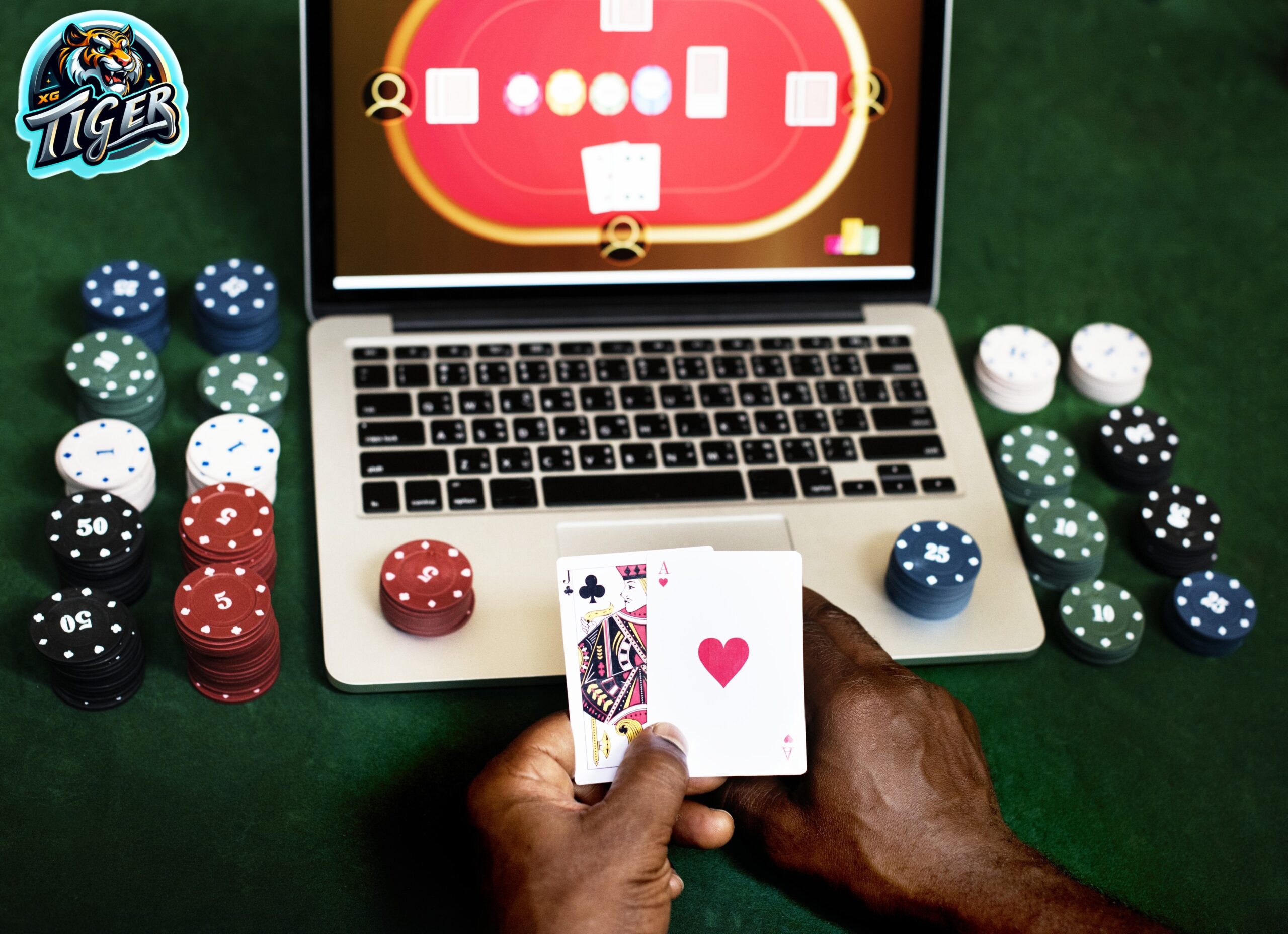Table of Contents

Many people have made a career out of poker over the past few decades.
The almost unlimited potential to earn money along with the free lifestyle is one of the main reasons behind this phenomenon.
However, while tens of thousands of people play poker for a living today, a select few have been more successful than others.
Players who turn the game into a profitable endeavor spend a lot of time learning the ropes.
Most go through a lot of ups and downs before finally finding their comfort zone, but some seem to almost skip this whole process and go from learning the rules straight to winning.
This naturally brings up the question of why. Read here at Xgtiger Casino.
What makes it so easy for these players to master the game? Are they somehow naturally predisposed to excel at poker?
Is the game part of their personality, and, more importantly, is poker in your DNA?
What Makes Someone Great at Poker?
If you are a poker fan, you must have thought at least once or twice what it would be like to play the game professionally. Even for the calmest and most rooted of spirits, the idea has some appeal to it.
But, there is always a big question that comes from these thoughts. Do I have what it takes?
A Mathematics-Inclined Brain
First and foremost, poker is a numbers game.
You will hear many different opinions on the subject, but the bottom line is that you need to understand the math behind the game in order to be good in the long run.
Have you always had a knack for numbers, graphs, and percentages? If yes, you are good at poker.
Many of the players you see on TV who have built their bankrolls from scratch enjoy numbers far beyond what most people can achieve.
It’s one thing to understand how percentages work. Enjoying them is another matter entirely. If you’ve read the last few paragraphs with your head shaking, don’t worry: All is not lost. Being crazy about numbers can be a great asset for a poker player, but it’s not essential.
Poker probably isn’t in your DNA if you hate math and don’t want to be around it.
One of the things that makes poker a game of skill and strategy is its mathematical aspect. Without it, it’s just a card game where the luckiest person wins.
Good Instincts You Can Trust
Another personality trait that may indicate that poker may be in your DNA is good instincts.
We all have instincts, but few trust them.
You know it at this point if you have good instincts and intuition. You’ll come into situations where you rely on them, and they’ve helped you out of some tough spots.
At the poker table, good instincts can be truly invaluable.
Even though the game is all about odds and statistics, you only have a limited range of information to work with. Part of it is divination.
Of course, math wizards rely on complex GTO calculations to figure this out, but good instincts can also come in handy.
So, if you are good at “reading” people, that is, figuring out when someone is being dishonest with you, you will find this skill to be very useful, especially in live games , where people often do not. hide their feelings or do a poor job of it.
Risk Tolerance
Poker has an element of gambling in it in the short term.
Even the best of the best are often in a position where they come close to breaking their entire bankroll (or did), either due to terrible luck, poor bankroll management, or, often, a combination of both.
But when you listen to them talk about it, you can almost hear the excitement in their voices. You don’t get the feeling that they are talking about something unpleasant.
This is because people with poker in their DNA have a higher tolerance for risk and do not see this aspect of the game as tragic.
If you’re a natural gamer, you’ll enjoy every aspect of it in some way – even the not-so-pleasant parts.
You’ve probably heard poker players refer to themselves as “degens” (an abbreviation of a degenerate gambler, meaning always ruined by gambling).
Now, in what world could this word have any positive meaning?
The answer is – in the world of poker.
You don’t want to be a “degen” or careless, but, at the same time, you do.
Playing poker is not just about making money. It’s about having fun and experiencing all it has to offer—the good, the bad, and everything in between.
You may be reading this and thinking – that’s not right; many great players don’t have that attitude.
You are right!
It is not a mandatory personality trait to be good at the game. Many great players have been observing this as a business and have had consistent results for decades.
These players usually build their bankrolls over a long period of time and still decide whether to lose. Their calm, calculated, and systematic approach to the game has served them well.
Those who build their seven-figure bankroll in months are more likely to make sense nt future risk and bust. Just think about someone like “Isildur1.”
He can go through seven figures in a matter of hours without blinking.
And when he busts, he goes back to grinding at lower stakes and rebuilds his roll to do it all over again.
This is not what you would call “normal” behavior, but until recently, poker was not considered a regular profession either.
Not caring too much about what people think of you
Since poker is still not widely accepted, you probably have to think outside the box to fall in love with the game.
In a society set up this way, how do you come up with the idea of playing cards and shuffling chips for a living?
What happened to good, old-fashioned hard work and ambition?
Most people outside of the poker world need to understand that playing poker seriously is hard work. It’s more than just learning to play well.
It’s hard to put in your best effort every time you sit down at the table and repeat it session after session.
It seems easy to someone looking in from the outside, but it’s anything but easy, even if poker is in your DNA.
Considering all these things, you need to be the kind of person who is comfortable stepping outside the traditional boundaries of society.

Unless you’re very lucky, your loved ones will be at least mildly shocked at the idea that you’ll find poker a career choice.
It takes a certain person to fight all the negativity and stand their ground.
But if you truly love and enjoy poker and naturally feel good about it, it won’t matter.
It’s weird, but it’s one of those things you’ll probably find out after playing your first cash game or a tournament.
Even with little knowledge about the exact strategies, the game will make sense to you.
You’ll feel like you belong at a poker table despite being surrounded by players who are more experienced than you when you have a feeding frenzy on your stack.
You’ll find there’s a way to get better and return the favor, and you’ll be eager to learn about the game.
If you think poker is boring or not very exciting, you can still be an exceptional player. However, you’ll enjoy it more than someone who appreciates every moment of it in some way, including the mandatory bad beats and coolers.
Hard Work vs. Natural Talent – What Matters Most?
I’ve said repeatedly throughout this article that you don’t need to be a poker genius to succeed.
As with most things in life, natural inclination is a good starting advantage, but it doesn’t guarantee anything.
Having poker in your DNA alone will not make you one of the top players, especially today.
This can be a bad thing sometimes.
Naturally talented players often experience a level of success early in their careers. Coupled with some good runs, their talent is enough to make them winners in the lower stakes, where the competition can be tougher.
However, as they climb the stakes, they encounter tougher opponents and learn that more than talent is needed.
It is at the junction where poker players are made or broken.
Players who realize that they need to use their talent and apply themselves to learning the game in order to continue to grow will thrive and succeed more often than not.
Those who aren’t willing to put in the time will either abandon the game or become the type of “reg fish” that games are built on.
Hard work beats talent 99 percent of the time in the long run, and we all know poker is about the long run.
So, Do You Have Poker in Your DNA?
The fact that you are reading this article regarding online poker suggests that you have some level of love for the game.
Otherwise, I don’t see how you could stumble upon it, especially in these last few paragraphs.
If you recognize yourself in some of the points I’ve made here, you probably have at least a little bit of poker in your soul.
Whether it’s just a trace or a serious part of your entire genome can’t be determined without further testing.
On a more serious note, you should focus on something other than this idea.
You don’t have to be a genius to be a good poker player. You’re halfway there if you enjoy the game and don’t mind learning about it.
The biggest pitfall you can fall into is thinking you are too good and talented to take advice from anyone.
If you don’t consistently lose games, it doesn’t matter if you have poker in your DNA. This is a clear sign that you need to improve – and you won’t achieve that without serious work.
Take advantage of every opportunity you can to learn and improve, and it won’t be long before you’ll be watching all the “talented” kids in the rearview mirror as you climb the ranks!
Conclusion
Are you an avid gaming fan and want to know how to bet on online casino games? At Xgtiger, you’ll get the latest information on this year’s best casino games and a variety of gaming options, all in one place.
To start your online gambling journey, all you need to do is create an account on the site, deposit funds and you’ll be ready to bet on the best and most anticipated casino games.
Frequently asked questions
Decent Mathematic Skills
While you don’t have to be a mathematician to be good at poker, a solid understanding of maths and a natural affinity for it is certainly beneficial. The best poker players can quickly calculate the odds of a hand and what other players might be holding.



